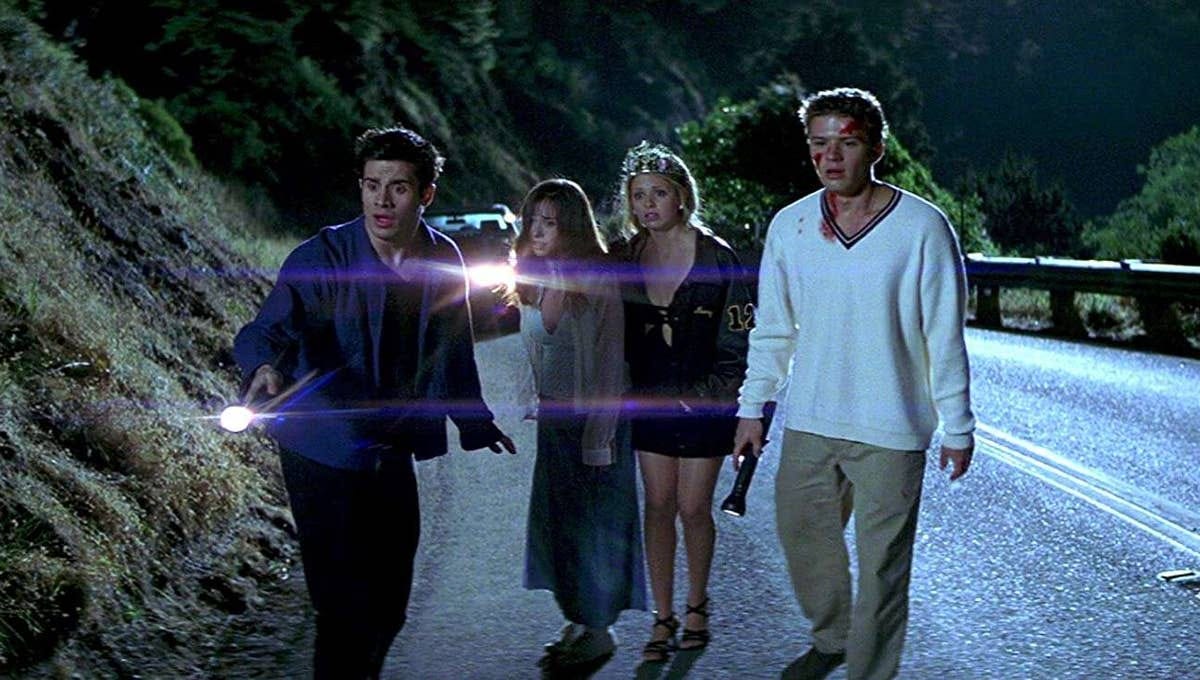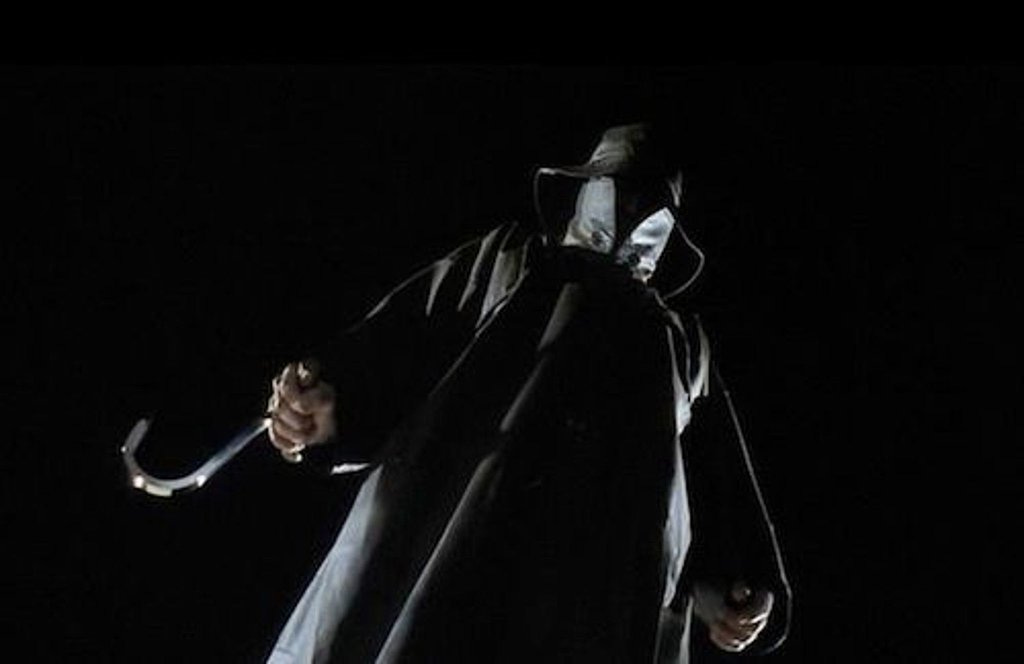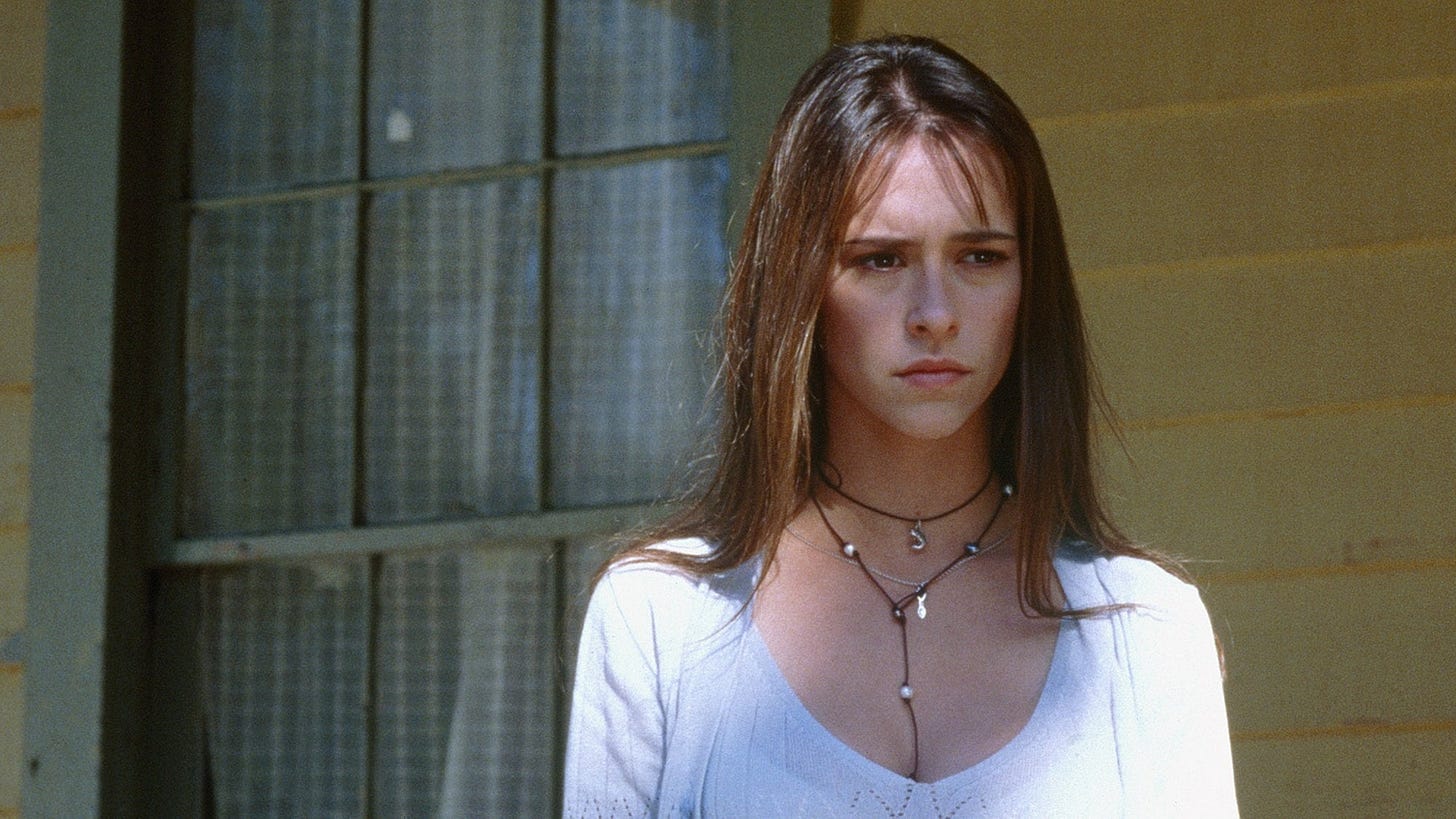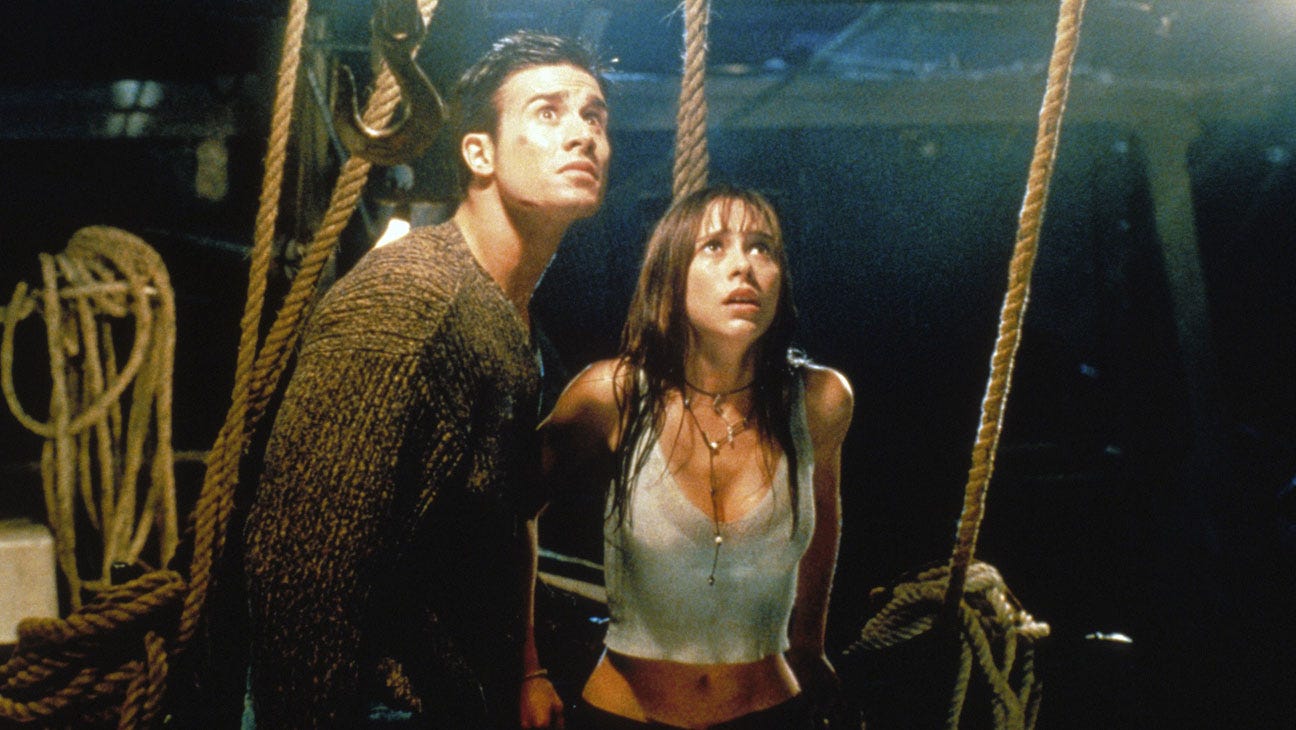I Know What You Did Last Summer (1997)
8/10
In general I tend to only review movies I haven’t seen before. In the case of classic ’90s slasher flick I Know What You Did Last Summer—directed by Jim Gillespie, penned by Scream writer Kevin Williamson, and loosely based on a novel by Lois Duncan—I watched it so long ago I don’t remember that much about it, and can’t even recall if I saw the ending. Either way, I got more than expected out of watching it again. Like a lot of the neo-slasher films that followed the success of Scream, I Know What You Did Last Summer is more slickly produced than the low-budget exploitation fare that defined the slasher movie in its ’80s heyday. But beyond higher production values and a top-notch cast for its era, the film is one of the more thoughtful variations on the slasher formula.
Right off the bat, I Know What You Did Last Summer has one of the best premises of any slasher pic. The film begins on July 4, 1996 as high school friends Julie James (Jennifer Love Hewitt) and Helen Shivers (Sarah Michelle Gellar), along with their respective boyfriends Ray Bronson (Freddie Prinze Jr.) and Barry Cox (Ryan Phillippe) attend a beauty pageant in Southport, North Carolina where Helen is crowned the winner. The four drive to a beach afterward, tell scary stories around a fire, talk about their plans after graduation, drink, have sex; the couples pledge devotion to each other. They are the very picture of carefree youth, looking to bright futures and endless possibilities.
It all comes to a screeching halt when the group accidentally hit a man with their car on the dark highway. Upon investigation, he appears to be dead. In a state of panic, fearing that to be discovered would ruin their lives, they decide to throw the man’s body in the water. He briefly revives before they manage to get him under. The teens vow never to speak of the incident again, and to take the secret to their graves. One year later, they find themselves receiving mysterious notes from someone who claims knowledge of their crime—and being stalked by a mysterious hook-wielding fisherman who begins to kill them one by one.
Part of the effectiveness of this movie is how it uses standard slasher tropes to reflect on more existential questions. Slasher movies typically revolve around a group of teenagers who drink, do drugs, have premarital sex, and then face lethal retribution for these “crimes” at the hands of a deranged killer. Film scholars have interpreted this formula many ways, often as a distorted form of Reagan-era conservative politics and backlash to more permissive mores around sex and drugs. In slasher films, teens who transgress “traditional moral values” are killed. The survivor, the final girl, tends to be the only one who does not indulge in drink, drugs, or premarital sex.
Another way to view these films is through their focus on youth. Teens are almost always the main characters in these stories. It makes sense from a creative and business perspective, since teens and young adults represent the biggest audience for horror at the multiplex, and can identify with characters of similar age. Older audiences can also enjoy these films, particularly those who came of age watching them. But as people get on in years, they can grow resentful of the young.
Older generations complaining about the behaviour and attitudes of “kids these days” is a trope as old as time. For an older viewer watching standard slasher films like the Friday the 13th series, it might be satisfying to watch annoying teen characters meet their demise. There might also be a sense of envy of youth, in the face of one's own advancing age. While young people seem to have their whole lives in front of them, the older we get, the more limited our opportunities become. The saying “youth is wasted on the young” encapsulates the elder’s yearning for lost youth.
All these themes are explored in I Know What You Did Last Summer. Our four young leads are having the time of their lives on the Fourth of July after graduation, looking to the future, when a harsh dose of reality arrives through their own reckless behaviour. Characters who moments ago were cocky and filled with hope now turn on each other. The spectre of seeing all those hopes vanish parallels what happens to many of us in life. We act and make decisions that for better or for worse determine how the rest of our lives will turn out. The suddenness of the change sparks panic among the characters, but the selfishness of douchey jock Barry wins the day. They dump the body and try to forget in a desperate bid to hold on to their youthful dreams.
It doesn’t work. A year later, we see Judy coming home from college looking sad and haunted. This bright student now struggles with her grades. Other characters’ plans have similarly failed. The stress of the situation causes each couple to break up. Helen had spoken of becoming a serious actress and studying in New York; Barry of becoming starting quarterback for the Dallas Cowboys; both of them eloping to Europe or the Caymans and having children. Instead, the pair have split. Helen is back in her hometown working retail under the supervision of her cruel sister Elsa (Bridgette Wilson). Barry doesn’t appear to be doing much of anything, except living with his rich parents. Ray has taken on the same job as previous generations in his family and become a fisherman.
The slasher plot proper kicks into action after Julie receives an anonymous note that famously reads, “I know what you did last summer.” From there, she reconnects with her former friends and they begin trying to figure out who is sending the notes. Initial suspicion falls on Max Neurick (Johnny Galecki of The Big Bang Theory in an early role), who drove by the scene of the crime and whose character might be summed up as “bitter incel”. Soon we see a mysterious fisherman, his face concealed—stalking the characters, harassing them, and eventually trying to murder them. Meanwhile, Julie and her friends try to solve the mystery of who the killer is.
That mystery element is one of the aspects that give I Know What You Did Last Summer more layers than your average slasher film. Another strength is the cast, who were just then coming to prominence. The film solidified Hewitt’s status as a teen idol and sex symbol. It was released the same year Gellar became a pop culture icon playing the title role in Buffy the Vampire Slayer. Phillippe’s stardom rose with subsequent movies like Cruel Intentions and Flags of Our Fathers. Prinze also became a teen idol of sorts, though his star only took a few years to fade. He’s also the weak link here. The other three give fairly strong performances for a slasher film, supported by Williamson’s script that gives the characters more depth than usual. While he offers a likable enough screen presence, Prinze’s line readings are often stilted and awkward.
I Know What You Did Last Summer is a time capsule in ways other than its cast, such as the ’90s alt-rock soundtrack. Using the internet to search for information is treated almost as a novelty, and has to be explained to the audience. Seeking information about their stalker, characters stop by a house claiming that their car broke down and ask if they can use the phone—no cellphones or smartphones here. For anyone who saw this around the time it came out, there’s a feeling of nostalgia throughout. It’s also a great-looking movie with good cinematography. The opening credits offer some amazing shots gliding over cliffs and water.
If there’s a significant area that’s a bit weak, it’s probably the reveal of the killer. On the one hand, the filmmakers keep you on the edge of your seat wanting to find out who the mysterious hook-wielding fisherman is, and throw numerous red herrings our way. The twist was effective for me in that I didn’t predict who the killer was. On the other hand, his motivation to kill these particular characters didn’t seem enough, other than being insane and exceptionally unwilling to let bygones be bygones. The movie also makes it a little too easy for the killer to appear wherever the plot needs him to be: murdering people and leaving almost no trace; quickly and spotlessly cleaning a car trunk that shortly before was full of crustaceans and a dead body. The climax, while a bit over the top, was still enjoyable.
All in all, I Know What You Did Last Summer is one of the best slasher movies produced after the first wave of the 1980s, and minus heavy hitters like Michael Myers, Jason Voorhees, Freddy Krueger, and Leatherface. It has a unique premise, is well produced with an appealing cast, and sparks reflection on life, youth, and mortality in a way that gives it a bit more class than most slasher films.








